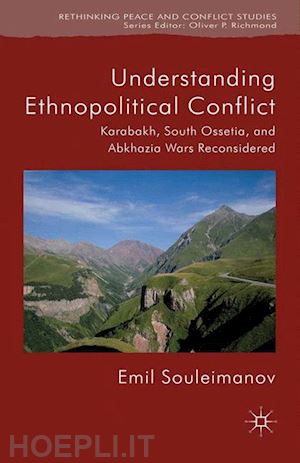Acknowledgements Preface 1. Introduction PART I: THE SOUTH CAUCASUS 2. Theories Of Ethnic Conflict And Civil War 3. Aims And Objectives 4. Methodological Remarks 5. Organization Of The Book 6. Note On Transliteration PART II: THEORIZING ON THE CAUSES OF CIVIL WAR AND ETHNOPOLITICAL CONFLICT 7. Explaining The Terms 8. Typology Of Conflicts 9. Conflict Vocabulary 10. Periodization In Ethnopolitical Conflict And Civil War 11. Phase A. Mobilization – Latent Conflict 12. Phase B. Radicalization – Sporadic Or Low-Scale Violence 13. Phase C. Sustained Large-Scale Violence – Civil War 14. Structural Accounts 15. Level Of Economic Development 16. Facilitating A Rebellion? Natural Resources, Diaspora And Geography 17. Demographic Factors: Ethnic Diversity, Size, And Proportions 18. Regime Type And Regime Change 19. Social Inequality Accounts 20. General Shortcomings Of Quantitative Research 21. Conflict-Escalation-Based Theories 22. Perceptional Accounts 23. Ancient Hatreds 24. Security Dilemma 25. Symbolic (Identity) Politics 26. Instrumentalist Accounts – Manipulative Leaders 27. Opportunity In Power Asymmetry: A Missing Causal Link Between Ethinc Riots And Civil War? PART III: THE SOUTH CAUCASUS 28. A History Of Identities, An Identity Of Histories 29. (I) Azerbaijan And Azerbaijanis 30. Azerbaijan 31. Relations With Persia And Persians, Or Turks And Turkey, In Historical Perspective 32. Relations With Russians And Russia In Historical Perspective 33. (Ii) Armenia And Armenians 34. Armenia 35. Relations With Turks And Turkey In Historical Perspective 36. Relations With Russians And Russia In Historical Perspective 37. (Iii) Georgia And Georgians 38. Relations With Russians And Russia In Historical Perspective 39. Forging Nation States: Societal Transition In The South Caucasus Republics 40. (I) The Internal Political Situation In Azerbaijan On The Eve Of The Breakup Of The Ussr 41. The Role Of Clans In Azerbaijani Politics 42. Mütällibov's Rule: Chaotic Internal Politics 43. Elçibäy: The Nationalists In Power 44. The Rise Of Heydär Äliyev 45. (Ii) The Internal Political Situation In Armenia On The Eve Of The Breakup Of The Ussr 46. Georgia 47. The Internal Political Situation In Georgia On The Eve Of The Breakup Of The Ussr PART IV: NAGORNO-KARABAKH, SOUTH OSSETIA AND ABKHAZIA: THE ASCENT OF ETHNOPOLITICAL CONFLICT 48. Nagorno-Karabakh 49. Conflict And Historiography 50. Chronology Of Escalation 51. Phase A: Mobilization – Latent Conflict 52. Phase B. Radicalization – Sporadic Violence 53. Phase C. Armed Conflict – Civil (International) War 54. The Conflicts In South Ossetia And Abkhazia 55. South Ossetia 56. Abkhazia 57. Conflict And Historiography 58. South Ossetia: Chronology Of Escalation 59. Phase A: Mobilization – Latent Conflict 60. Phase C. Armed Conflict – Civil War 61. Abkhazia: Chronology Of Escalation 62. Phase A: Mobilization – Latent Conflict 63. Phase B. Radicalization – Sporadic Violence 64. (I) Turkey 65. Relations With Azerbaijan 66. Relations With Armenia 67. Turkey And The War In Nagorno-Karabakh 68. (Ii) Iran 69. Relations With Azerbaijan 70. Relations With Armenia 71. Iran And The War In Nagorno-Karabakh 72. (Iii) Russia 73. Relations With Azerbaijan 74. Relations With Armenia 75. Russia And The War In Nagorno-Karabakh 76. (Iv) Russian Relations With Georgia 77. Russian-Georgian Relations And The War In South Ossetia 78. Russian-Georgian Relations And The War In Abkhazia 79. Phase C. Armed Conflict – Civil (International) War 80. Outcomes Of The Ethnopolitical Conflicts In Georgia PART V: CONCLUSIONS 81. Level Of Economic Development 82. Facilitating A Rebellion? Natural Resources, Diaspora And Geography 83. Demographic Factors: Ethnic Diversity, Size, And Proportions 84. Regime Type And Regime Change 85. Social Inequality Accounts 86. Ancient Hatreds 87. Security Dilemma 88. Symbolic (Identity) Politics 89. Manipulative Leaders 90. Expanding The Theory 91. In-Group Cohesion 92. External Support To Secessionist Movements Bibliography











